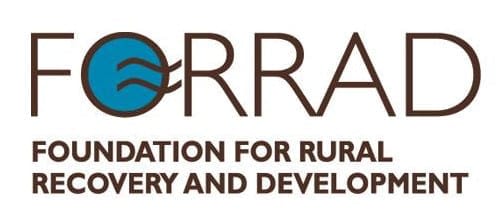
About FORRAD
The Foundation for Rural Recovery and Development (FORRAD) was established in Delhi in 1980 with the objective of promoting, supporting, and coordinating initiatives in sustainable agriculture and the protection of natural resources. Over the past four decades, FORRAD has extended technical and financial support to more than 450 grassroots projects across rural India, building strong partnerships with local communities and organizations.
FORRAD’s work focuses on the needs of smallholder farmers, sharecroppers, and the most vulnerable and marginalized communities. The groups that are the worst affected by the consequences of climate change, yet have the least access to resources and decision-making spaces. FORRAD places these communities at the center of its interventions, ensuring that they are the primary stakeholders who shape and often lead the initiatives.
Central to its work is strengthening water security and promoting low-cost regenerative agriculture as strategies to mitigate climate risks and restore ecological balance. FORRAD has revived and restored traditional water conservation and management practices, enabling communities to build resilience against droughts and erratic rainfall. More than aware of the nutrition crisis confronting the country and recognizing the close and inextricable link between water, agriculture, livelihoods, and health, FORRAD has, over the past five years, also integrated nutrition security as a core component of all its programmes.
Beyond water and agriculture, FORRAD engages with the intersecting issues of girls’ education, and community healthcare. All its projects are designed to be community-driven, with control over natural resources, information and related technologies vested in the local people themselves.
FORRAD’s guiding principles are rooted in equity and justice. The organisation ensures equal opportunities across gender, caste, and community. By creating spaces for the most disenfranchised voices to be heard and recognized, we work towards building resilient rural communities that can adapt to climate change, secure their livelihoods, and shape their own sustainable futures.
Previous Experience Thematically
Education
JB Singh Kanya Shiksha Setu – A Learning Centre for Girls in Bihar
The learning centre, established in 2017, now enrols 141 girls. All girls are enrolled in government schools, and the centre remains essential to address gaps in learning. Most students of the centre are first generation literate and do not have an environment that facilitates learning at home. The centre prepares students and their parents for ensuring learning at school. 140 children have been provided nutritious snacks at the learning centre. This has improved their parameters
Nutrition
In an action-research project initiated in late 2023, 300 children were assessed for malnutrition in Nalanda district, Bihar. These children belonged to the most marginalised community groups. Children were administered B-complex vitamins, supplementary nutrition in the form of a locally produced protein and energy mix, and put on a deworming regimen. Each child received nutritional supplementation for over 15 months. While results are encouraging, the acute and chronic malnutrition has created stunting and the children did not show the signs of height and weight gain as in other states like Tamil Nadu.
Agriculture
Transitioning to Low External Input Sustainable Agriculture in Bihar
700 acres of land in Nalanda district, Bihar transitioned to LEISA in the form of mixed cropping in the winter of 2025.
Tree Plantation
Over 1,600 saplings including mango, guava, banana, drumstick, hog plum (Amra), arjun (Kahua), jackfruit, mahogany, and teak were planted on pyne embankments in Bihar with farmers and local committees ensuring their protection.
System of Rice Intensification in Thiruvallur district, Tamil Nadu
96 farmers were motivated to use the SRI method of rice cultivation over their fields covering a total of 173 acres. SRI uses half the water that the traditional method does.
Water
1. Pyne Restoration in Bihar
FORRAD has restored 34 km of pynes (flood diversion channels from seasonal rivers) in Bihar creating a standing storage of 200 million litres of water serving a command area of 4000 acres of farmland.
2. Rainwater harvesting around the Sambhar Salt Lake (In partnership with Manthan Sanstha and Prayatna Sansthan)
Storage capacity of 1.5 billion litres created through restoration of 31 rainwater harvesting structures in 20 villages around the Sambhar salt lake. Each year, about a billion litres of rainwater is collected. The reservoirs are maintained by the panchayats with support from district and state authorities.
3. Water storage for individual households (In partnership with Manthan Sanstha supported by individual donors)
Water storage tanks of 10,000 litres each were constructed for 206 vulnerable families in remote hamlets lacking regular water supply. These communities now have means to store water from weekly tanker deliveries.
4. Watershed development in UP Bundelkhand (In partnership with Gramonnati Sansthan)
Watershed development over 1,000 acres in Bilkhi and Tola Swayam villages in Uttar Pradesh transformed wasteland into productive farmland through farm-bunding, check-dams, ponds, and tree plantations.
5. Farm bunding in Dikwaha began on 35 acres of land to conserve water and soil. It was expanded to 110 acres on demand from the community and mandated by panchayat, with farmers contributing 10% via shramdaan and five wells cleared for drought relief. In Baniya Tala, bunding started on 28 acres and extended by 18 more acres after panchayat interest, benefiting additional farmers.
6. The restoration of 39 km of traditional irrigation channels in Tiruvallur district allowing for the use of surface water for irrigation thereby reducing dependence on groundwater and greatly benefitting the small-holder farmers who do not have their own tube-wells.
7. The cleaning of 60 public overhead tanks, (30,000 – 60,000 litres) and 16 school tanks significantly reducing bacterial contamination in water. The tanks are now maintained by the local panchayat with occasional reminders from the community.
8. The cleaning, chlorination, and covering of 22 open wells that had fallen into disuse with the coming of piped water and were being used as garbage dumps.
Fundraisers

Alleviating Acute and Chronic Child Malnutrition in Bihar
- Raised
- $600
- Goal
- $70,000
Donors
Ellen Fish To the fundraiser: Alleviating Acute and Chronic Child Malnutrition in Bihar
